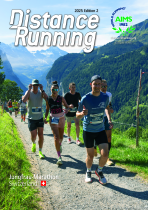Marathon movers Comrades Marathon
08 January 2013, 8am UTC
Jackie Mekler
Jackie Mekler’s competitive running career started on the 27 December 1945, at the tender age of 13. He went on to win the Comrades Marathon five times, setting the up-record (from Durban to Pietermaritzburg) of 5:56:32 in 1960. In doing so he broke Wally Hayward’s record by 16 minutes and became the first runner to beat six hours on the up-run. At the time this was considered the greatest-ever feat in Comrades.
He set the down record (from Pietermaritzburg to Durban) of 5:51:20 in 1963 only 10 days after running a 2:36 marathon in Greece, from where he had returned only the night before. He also twice finished second and third in Comrades, winning in all 10 Comrades gold medals (awarded for finishing in the top 10 places). In 1960 he won the London-to-Brighton race in Great Britain – also in a record time of 5:25:26. In 1954 and 1955 he set world track records at 30, 40 and 50 miles and finished second in the 1954 Empire Games marathon in Vancouver, the race in which world record holder Jim Peters tragically collapsed.
Mekler’s early running started as an expression of his aloneness. In running he found an escape from the restrictions of the orphanage in which he was brought up. He learned that he enjoyed his own company and throughout his career, seldom trained with others. “I became apprenticed in the printing industry and did all my weekday training by running to and from work, piling in up to 200 kilometres a week. I won my first race, the South Transvaal Marathon, in 1952 when I was 20, and also ran my first 54-mile Comrades Marathon in which I finished seventh”.
Mekler read and absorbed all Arthur Newton’s ideas but did not follow them unreservedly as he did not believe that any single approach could suit everyone. In 1953 he travelled to London with Wally Hayward and Fred Morrison to run in the London-to-Brighton race in Great Britain, which had just been inaugurated under the newly-formed Road Runners’ Club. Mekler stayed with Newton and their mutual respect soon developed into a lasting friendship. In 1955 Mekler went back to London and stayed with Newton for one year. From this experience, Mekler concluded that Newton taught an outlook on life rather than a training method.
Mekler’s training sessions always ended with a fast finish. Unlike Newton he raced on the track and regularly competed in cross-country races. He did not specifically train for the Comrades Marathon, but ran all his training on the hardest courses he could find, which took a toll: “Five years of undiagnosed anaemia left me with erratic performances until 1960 when I regained my best form, setting records in the Comrades Marathon and the London-to-Brighton races. Three weeks later I attempted a record for the 100 miles from London to Bath, but the London-to-Brighton had left me with a strained Achilles tendon which forced me to abandon at the halfway stage. The tendon refused to heal for a year until surgery allowed me to slowly return to form. Much to my disappointment I lost two Comrades races to British runners in 1962 and 1965, but I won my fifth Comrades in 1968 after a two-year break from competition. This period provided great competitive rivalry between England and South Africa and I was elected an honorary vice-president of the Road Runners’ Club.”
Mekler won Comrades in 1958, 1960, 1963, 1964 and 1968 collecting in all 10 gold medals, a feat which only Bruce Fordyce, with 9 wins and 11 golds, has bettered. To date only Arthur Newton, Hardy Ballington, Wally Hayward, Jackie Mekler and Bruce Fordyce have won five or more Comrades Marathons.
Mekler ran to win or to beat a record in every race he entered : “Peaking for races was something I knew nothing about; one race always seemed to flow into the next. Still, I have no regrets that I might have run faster times had I raced less or been better informed.” He claimed to instinctively know what pace was right. When asked to list those factors that he would change if he had his running career over again, he replied that he would choose his parents carefully, would live near his work and would choose a career in the Army, Police or on the mines.
Running has remained a strong thread throughout his life and he is still active at 80, having passed the 160,000km mark. After retiring from the printing business in 1960, Mekler took up farming in the old Eastern Transvaal. Today he exports avocado pears all over the world. “Running gave me health, fitness and wonderful memories to reflect on the races I won and lost, the friendships it brought, and the unrivalled experience of running alone in the majestic mountains of South Africa.”





